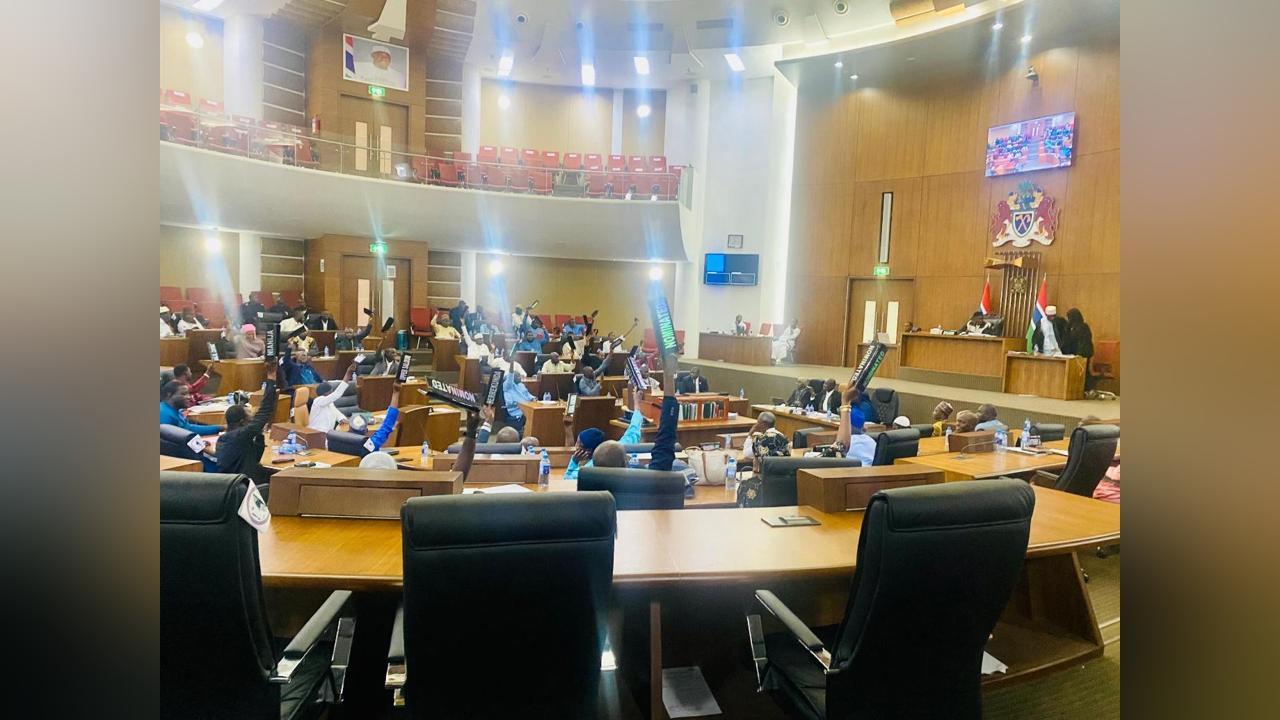Africa-Press – Gambia. The National Assembly has once again rejected a bid to overhaul The Gambia’s Constitution, voting down the Constitution of the Republic of The Gambia Promulgation Bill 2024 after hours of tense debate marked by sharp exchanges across the aisle.
Tabled by Attorney General and Minister of Justice Dawda Jallow, the bill sought to repeal and replace the 1997 Constitution. For it to move to the next legislative stage, the bill needed the support of at least 75 percent of all members or 44 out of 56 NAMs. In the final vote, 35 members backed the bill, 21 voted against, and none abstained.
Announcing the result, Speaker Fabakary Tombong Jatta declared that the draft constitution had failed to meet the constitutional threshold. “While the outcome may disappoint some, it reflects the principle that constitutional reform must rest on broad consensus,” Jatta said, urging continued dialogue.
Justice Minister Jallow opened the debate by reminding members of the failed 2020 attempt and urged them not to repeat what he called “the mistake of 2020.” He told lawmakers the bill was not perfect but would allow Gambia to build “a stronger, more democratic republic that serves all our people with justice and dignity.”
Jallow stressed that the new draft retained 80 to 85 percent of the content from the 2020 version and could be improved at the committee stage. “Perfection is not the standard. Progress is,” he said.
Majority Leader Billay G. Tunkara, defending the government’s position, told the Assembly: “This is a rare opportunity for us as a country. If we miss this chance, it could take decades before we get it again. We, on this side, are ready to listen, ready to compromise. Bring your concerns sincerely, and we will sit and adjust where necessary. We must not repeat 2020. Let us put aside personal interests and think about the future of The Gambia. We are not here for ourselves but for generations to come.”
Hon. Alhagie S. Darboe, Minority Leader and NAM for Brikama North, argued that mistrust lingered. He accused the majority of not fully embracing genuine compromise. “Negotiations, consensus building, dialogue not personal attacks must guide us,” he told colleagues. “If we do not trust each other, we will keep repeating these mistakes.”
Hon. Biram Sowe, NAM for Niamina West, lamented that too many consultations had produced little understanding. “There are too many people in this country, and it is all government without intention of sabotage. Sometimes I blame others because they themselves don’t understand the process,” he said.
Hon. Touma Njie, NAM for Banjul South, delivered one of the strongest rejections. She described the draft as disappointing, warning that it removed fundamental safeguards. “We expected a more inclusive and progressive constitution. This is a burial, and unfortunately, that’s how it looks,” Njie said. She slammed the removal of guarantees for free secondary education and the retention of nominated members. “Constitutional principles are the values that underpin a liberal democracy. If we cannot hold our leaders accountable, I don’t see how strong that democracy can be.”
Hon. Abdoulie Njai, NAM for Banjul Central, argued that the majority side had shown goodwill but was unfairly blamed for political games. He urged fellow NAMs to rise above blame and debate constructively. “It is rather disheartening to hear a member stand here and misinform people,” he said. “How can you stand in this chamber and say accountability is not there?”
Hon. Lamin Ceesay, NAM for Kiang West, reminded colleagues that constitutional reform is rare and takes decades. “This is a rare opportunity for us. I assure you, if you are sincere, we are ready to listen and make compromises,” he told both sides.
Hon. Alhagie Jawara, NAM for Lower Badibou, joined the debate to caution against repeated rejection. “The future belongs to progressive thinkers. We must sacrifice today for tomorrow,” he said, echoing calls for MPs to think beyond partisan divides.
When the votes were counted 35 in favour, 21 against it was clear the majority side had not secured enough support to reach the required three-quarters. Speaker Jatta thanked all NAMs for what he described as a mature and historic debate. “The failure of this bill does not signify the end of constitutional reform,” he said.
In his final response, Justice Minister Jallow stressed that despite the setback, The Gambia’s constitutional journey would continue. “It is very important that we understand this process has not been in vain,” he said. “No matter the type, the delivery of a constitution is symbolic of a transitional democracy.”
For now, the path toward replacing the 1997 Constitution remains uncertain. Many NAMs left the chamber divided but agreed that the debate about the country’s democratic future must go on however long it takes.
For More News And Analysis About Gambia Follow Africa-Press






